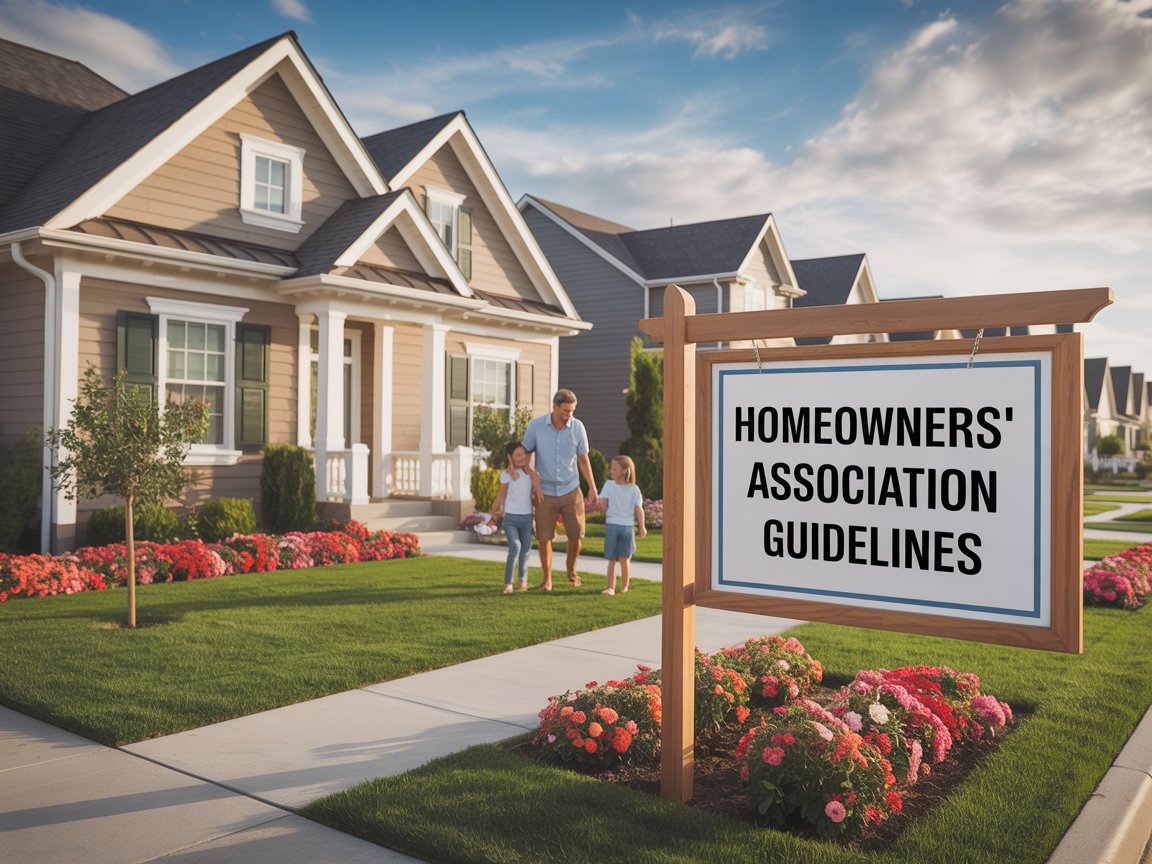Browse By Category
Browse By Location
Exclusive Offers & Discounts Await

Enjoy Life At Its Finest With Desai Homes

June 23, 2025
Max 8 min read
Shifting to a new housing community can be exciting and overwhelming! While settling into your new home can be a hassle, it is essential to familiarise yourself with the rules and regulations set forth by the Homeowners’ Association, commonly abbreviated as HOA. Throughout this blog, let us take a closer look at the foundation of an HOA, its role in the community, how it operates, and some of the HOA's common rules and regulations. If you’re a homebuyer or investor, understanding how these rules and regulations work can help you settle in smoothly.
The HOA is an association formed by homeowners within a specified residential development or neighbourhood. An HOA is primarily set up to manage and maintain common areas and shared amenities & facilities across a residential neighbourhood or community. Commonly run by a set of homeowners from the residential neighbourhood, in addition to a set of elected volunteers across the region. A reasonable amount of money is acquired as HOA fees to keep the association running and establish and enforce rules that help maintain the community’s comprehensive appearance, property values, and quality of life.
The HOAs are structured systematically to ensure that the community works in adherence to the rules and regulations set up by the HOA. It ideally comprises the following bodies:
Now that we’ve had a look at how the HOAs work, let's take a look at the rules and regulations set by HOAs across the world that govern community living. The following are some of the common practices observed:
Parking Constraints: Proper parking regulations can help in managing the limited parking spaces while preventing overcrowding and obstruction. This enables the residents to acquire designated parking spots and garages. This is essential in helping situations such as guest parking or storing additional vehicles.
Noise Limitations: Noise regulations help in creating peaceful and healthier residential spaces. You can establish quiet hours between 10 PM and 7 AM with exceptions on special occasions to limit disruptions.
Pet Regulations: Pet regulations are essential to address the responsibilities of pet parents within the community. These regulations cover the number of pets allowed, pet safety, and cleaning up after pets to maintain the comfort, safety, and cleanliness of the community.
If you're considering adopting a pet in your apartment community, it's important to understand the pet regulations in place. Learn more in our guide: Things to Consider If You Want a Pet in Your Apartment.
Rental Guidelines: The renting and leasing guidelines vary depending on the HOA and the residential neighbourhood. While some HOAs prohibit rentals, other HOAs may require the homeowners to follow certain procedures to ensure the safety and well-being of the community.
Landscaping Maintenance: Lawn care and plant upkeep are important to maintain the overall appeal and aesthetics of the residential community. This can lead to improved quality of life as well as increased property appreciation values over time.
Waste Management and Recycling: Proper waste management is instrumental in maintaining cleanliness and overall hygiene across the community. The HOAs may schedule and provide guidelines for effective waste disposal while promoting green and eco-friendly practices to keep the community environmentally conscious. This waste segregation can also help in recycling appropriate items.
Maintenance Standards: Home maintenance regulations assist in sustaining the prime condition of your home, preventing deterioration, and maintaining its value. These regulations ensure regular inspections and maintenance of your home and components such as roofs and fences.
Residential Business Restrictions: Home business rules regulate the operations of commercial activities set in residential neighbourhoods. To avoid disturbances, it's vital to know that all rules are followed, as these activities may disrupt the neighbourhood's peace or daily lives.
Common Amenities and Facilities: One of the HOA's major functions is to govern the use of shared spaces, amenities, and facilities. These regulations oversee the timing of operations, policies on guest visits, and proper conduct within the area.
Security Precautions: The HOA security rules are important for the safety of the community, the residents, and the property. This includes the installation of CCTVs across the community areas, alarms, the collection of guest details, and more.
Though violating HOA rules is not considered a criminal offence, it can carry significant penalties, including legal notices, suspension of privileges, and fines. The following are the consequences homeowners may encounter for failing to comply with the HOA rules and regulations:
Notice: The HOA initiates by sending you a notice about the rule that you may have violated, along with the information for correction that should be implemented within the specified period.
Get in Touch with the Committee: Get in Touch with the Committee: It is important for you to contact the committee members to update them on the situation and reassure them that the violation has been removed.
Fine: If you fail to rectify the violation within the specified time, the HOA has the right to escalate the matter by imposing a fine and potentially seeking court orders.
Resolution: After making the appropriate corrections, you can reach out to the HOA committee to confirm the correction. If you believe that you were wrongly accused, you can provide the proof to the committee to resolve the issue.
Understanding and acknowledging the rules and regulations of your homeowners’ association is important for keeping the residential community safe and secure. These guidelines allow homeowners to enjoy a healthier and more peaceful community life free from conflicts and unexpected dangers.
When searching for your new home, choosing a developer who understands the importance of community lifestyle can make a major difference. Desai Homes offers well-designed homes that provide quality living spaces for community living that ensuring both well-designed homes and efficiently managed communities.
Contact us today to invest in a home that prioritises your comfort, security, and lifestyle choices.
Welcome to Desai Homes, where your dream of owning a perfect home becomes a reality. As one of the leading real estate developers and builders in Kerala, we take pride in crafting exquisite living spaces that embody elegance, quality, affordability and comfort. Every construction project is undertaken with the utmost inspection and care, ensuring every detail is meticulously executed to exceed your expectations. We embrace cutting-edge technologies to create homes that stand the test of time, doing our part for sustainability and innovation. Everything we do is centred on delivering excellent & exceptional customer service. We are aware that a house is more than simply a building; it is also your safe space, where cherished memories are created. We go above and beyond to offer personalised solutions that are catered to your needs. Discover a range of thoughtfully designed projects in Kochi, Kottayam, Thiruvalla, Trivandrum, and Thrissur, each boasting top-notch amenities, easy accessibility, prime locations, and worth every penny. We have something to suit every lifestyle and budget. Come, find the perfect abode for you and your loved ones with Desai Homes. Experience the epitome of luxury, functionality, and serenity with us.